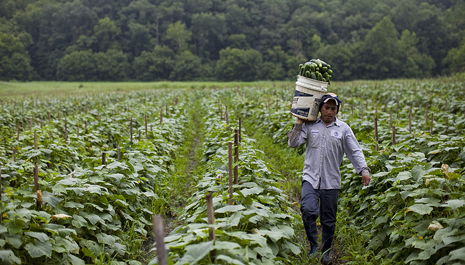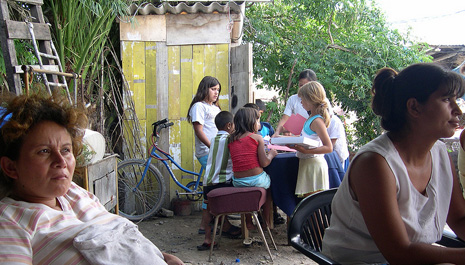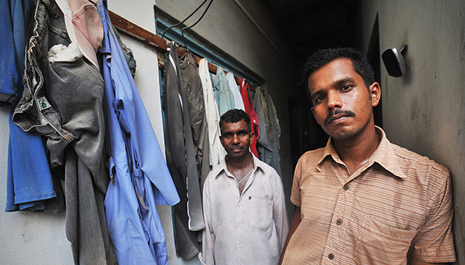Gender
(Research papers and policy briefs below)
Women represent a growing proportion of international migration; nearly 50% of all migrants today are female. In some regions the proportion is higher. In contrast to past decades, most adult migrant women today are economically active.
Differential opportunities for employment affect men and women differently. Demand for migrant workers in destination countries is defined by labour market segmentation in those markets: opportunities are usually available for low-skilled jobs considered suitable for women. The feminisation of international labour migration, together with the fact that most job opportunities for women migrants are in unregulated sectors (agriculture, domestic work, sex industry) and the existence of gender-disaggregated labour markets contribute to the increase of discriminative employment in countries of destination. As a result, female migrants often suffer 'double discrimination', as women and as migrants. In addition, women have less access to information on migration/job opportunities, recruitment channels, and often have less preparation than men to cope with the working and living conditions in countries of destination.
However, whether in countries of origin or host countries, women migrants contribute to change, innovation and social integration. In migrants' family plans, it is often the women who take the decision to stay on in the host country or return to the country of origin. Women migrants are more independent financially, and in many cases migration is their first opportunity of working and earning a living. Migration changes gender relations and sense of identity and about how social relations between the sexes can influence migrants' social-support networks, economic input and civic participation, in both host country and the country of origin. Immigrant women meet social needs of host countries and are part of the new patterns of mobility resulting from accelerated globalisation. In destination countries women migrants are an important factor in family balance and social integration and contribute to social cohesion.
Nonetheless, the threefold discrimination - of gender, class and nationality - suffered by many foreign women workers has a particular impact on their integration - or lack of it. The situation affecting women immigrants on the labour market, where they typically suffer all of the disadvantages specific both to women and to immigrants, makes them more liable to find themselves unemployed than women of the indigenous population. Low status and disfunctional work/life balance are pivotal problems for women immigrants and are compounded by discrimination-induced difficulties.
In a global context of stratification of employment and segmentation of labour markets, women migrants hold particular appeal for employers as they are sought after for 'women's work' that, not coincidentally, is usually low paid and unprotected: domestic work, healthcare, agriculture, hotel and restaurant, semi-skilled manufacturing in export processing zones. Common across these sectors is that while some workplaces may be highly socialized, they are not organized, meaning no unions or associations for mutual defense and solidarity, nor any bargaining power to press for decent work conditions.
Women and girl migrants are at high risk of sexual and gender-based abuse, exploitation and violence to a greater or lesser degree in all countries of residence and employment. Adoption of ILO Convention 189 on Decent Work for Domestic Workers brought attention to a sector of activity that is almost entirely comprised of women workers, while the most recent ILO Convention 190 and Recommendation No. 206 concerning the elimination of violence and harassment in the world of work is especially pertinent to the high risk and often unreported rates of harassment and abuse faced by women migrants. Promotion of ratification of these conventions should be springboards to highlight and address the generalized lack of effective protection faced by women migrant workers in agriculture, in textile sweatshops, in services, and elsewhere as well as in domestic work in industrialized countries across the global North as well as in the South.
GMPA members include recognized expert researchers and policy advisers on migration and gender. GMPA supports elaboration and implementation of gender specific and gender sensitive polices and practices essential to ensure protection, empowerment and equality of treatment for migrant women and girls.
Documents and Papers
- COVID-19, Migrants, Refugees, Mobile Workers: Global Assessment and Action Agenda. P.Taran & O.Kadysheva. (2022). Revista Tecnológica - Espol.
- Women Migrant Workers in the Laws and Policies of ASEAN Member States, ASEAN, 2022 (authored by J.Aeberhard-Hodges & R.Chaudhary)
- Recommendations on the Protection of Women Human Rights Defenders at Risk in Migration Contexts. UN Women, 2022 (with contributions by GMPA/P.Taran and T.Fakhoury)
- Return and reintegration challenges and policy responses in Asia following the COVID-19 pandemic. P.Wickramasekara, ADBI – OECD – ILO, 2022.
- Women migrant workers’ labour market situation in West Africa, ILO, 2020 (drafted by V. Castillo Rueda)
- Malaysia: Review of admission and recruitment practices of Indonesian workers in the plantation and domestic work sectors and related recommendations. P.Wickramasekara, ILO, 2020.
- Migrant Women, Women Migrant Workers. Crucial challenges for advocacy, services and action. Taran, 2018.
- Migrant Women, Women Migrant Workers: Crucial Challenges for Rights-based Action and Advocacy. Taran, 2016.
- The Gender-Migration-Employment Nexus, PIPER, 2012.
- Making Visible the Violence against Haitian Migrant, in-Transit and Displaced Women on the Dominican-Haitian Border, WOODING & PETROZZIELLO, 2012.
- Female Migration Outcomes: Human Rights Perspective, issue of UNESCO Diversities Editions, PIPER, 2011.
- La Presencia de las Mujeres Migrantes Haitianas en el Servicio Doméstico en la República Dominicana.” WOODING & SANGRO, 2011.
- In the Shadows of Family Life: Toward a History of Domestic Service in Lebanon, Jureidini, 2009.
- Gender and Labour Migration in Asia, IOM book, include article from PIPER, 2009.





